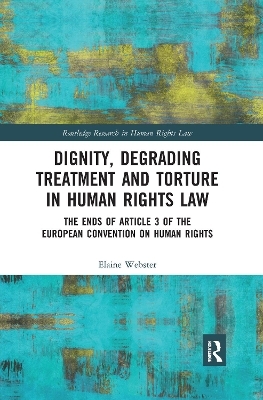
Dignity, Degrading Treatment and Torture in Human Rights Law
The Ends of Article 3 of the European Convention on Human Rights
Seiten
2019
Routledge (Verlag)
978-0-367-89429-0 (ISBN)
Routledge (Verlag)
978-0-367-89429-0 (ISBN)
This book explores and evaluates the interpretive scope of the prohibition of degrading treatment in order to provide analytical tools to advance the application of the right not to be subjected to cruel or inhuman treatment or punishment in international, regional and domestic human rights law.
Although scholars have shown longstanding interest in the boundaries of interpretation of the right not to be subjected to torture and other prohibited harm, the existing body of work does not sufficiently reflect the significance of the interpretive scope of degrading treatment. This book argues that the degrading treatment element of the right is a crucial site of analysis, in itself and for understanding the parameters of the right as a whole. It addresses how, methodologically, the scope of meaning and application of the right not to be subjected to degrading treatment should best be identified and considers the implications thereof. It systematically examines the diverse aspects of degrading treatment’s scope, from foundations of legal interpretation to the drivers of humiliation. It draws on wide-ranging literature and extensive analysis of more than 1,500 judgments of the European Court of Human Rights, which has pioneered the right’s interpretive growth. The book aims to explore how the interpretive possibilities, and limits, of the right not to be subjected to degrading treatment turn upon the axes of human dignity and state responsibility, and aims to show how this right’s protection can be achieved as well as limited through processes of interpretation.
Dignity, Degrading Treatment and Torture in Human Rights Law provides interpreters with analytical tools to advance the application of the right not to be subjected to torture, cruel, inhuman or degrading treatment or punishment in international, regional and domestic human rights law. It will appeal to all who have an interest in understanding the right’s meaning, development, and potential scope of application, as well as those with an interest in methodologies of human rights interpretation.
Although scholars have shown longstanding interest in the boundaries of interpretation of the right not to be subjected to torture and other prohibited harm, the existing body of work does not sufficiently reflect the significance of the interpretive scope of degrading treatment. This book argues that the degrading treatment element of the right is a crucial site of analysis, in itself and for understanding the parameters of the right as a whole. It addresses how, methodologically, the scope of meaning and application of the right not to be subjected to degrading treatment should best be identified and considers the implications thereof. It systematically examines the diverse aspects of degrading treatment’s scope, from foundations of legal interpretation to the drivers of humiliation. It draws on wide-ranging literature and extensive analysis of more than 1,500 judgments of the European Court of Human Rights, which has pioneered the right’s interpretive growth. The book aims to explore how the interpretive possibilities, and limits, of the right not to be subjected to degrading treatment turn upon the axes of human dignity and state responsibility, and aims to show how this right’s protection can be achieved as well as limited through processes of interpretation.
Dignity, Degrading Treatment and Torture in Human Rights Law provides interpreters with analytical tools to advance the application of the right not to be subjected to torture, cruel, inhuman or degrading treatment or punishment in international, regional and domestic human rights law. It will appeal to all who have an interest in understanding the right’s meaning, development, and potential scope of application, as well as those with an interest in methodologies of human rights interpretation.
Elaine Webster is a lecturer in law at the University of Strathclyde, UK.
Preface and acknowledgements
Additional sources
Tables of cases
Chapter 1 INTRODUCTION
Chapter 2 DEGRADING TREATMENT WITHIN ARTICLE 3
Chapter 3 FRAMING THE CONCEPTUAL BOUNDARIES OF DEGRADING TREATMENT
Chapter 4 UNDERSTANDING THE BENCHMARKS OF DEGRADATION
Chapter 5 THE MEANING OF 'TREATMENT'
Chapter 6 THE ENDS OF ARTICLE 3: THE PROTECTION OF HUMAN DIGNITY AND THE LIMITS OF STATE RESPONSIBILITY
Chapter 7 FROM DEGRADING TREATMENT TO TORTURE, CRUEL AND INHUMAN TREATMENT
Chapter 8 CONCLUSION
Index
| Erscheinungsdatum | 12.12.2019 |
|---|---|
| Reihe/Serie | Routledge Research in Human Rights Law |
| Verlagsort | London |
| Sprache | englisch |
| Maße | 156 x 234 mm |
| Gewicht | 267 g |
| Themenwelt | Recht / Steuern ► Allgemeines / Lexika |
| Recht / Steuern ► EU / Internationales Recht | |
| Recht / Steuern ► Öffentliches Recht ► Völkerrecht | |
| Sozialwissenschaften ► Politik / Verwaltung | |
| ISBN-10 | 0-367-89429-7 / 0367894297 |
| ISBN-13 | 978-0-367-89429-0 / 9780367894290 |
| Zustand | Neuware |
| Haben Sie eine Frage zum Produkt? |
Mehr entdecken
aus dem Bereich
aus dem Bereich


